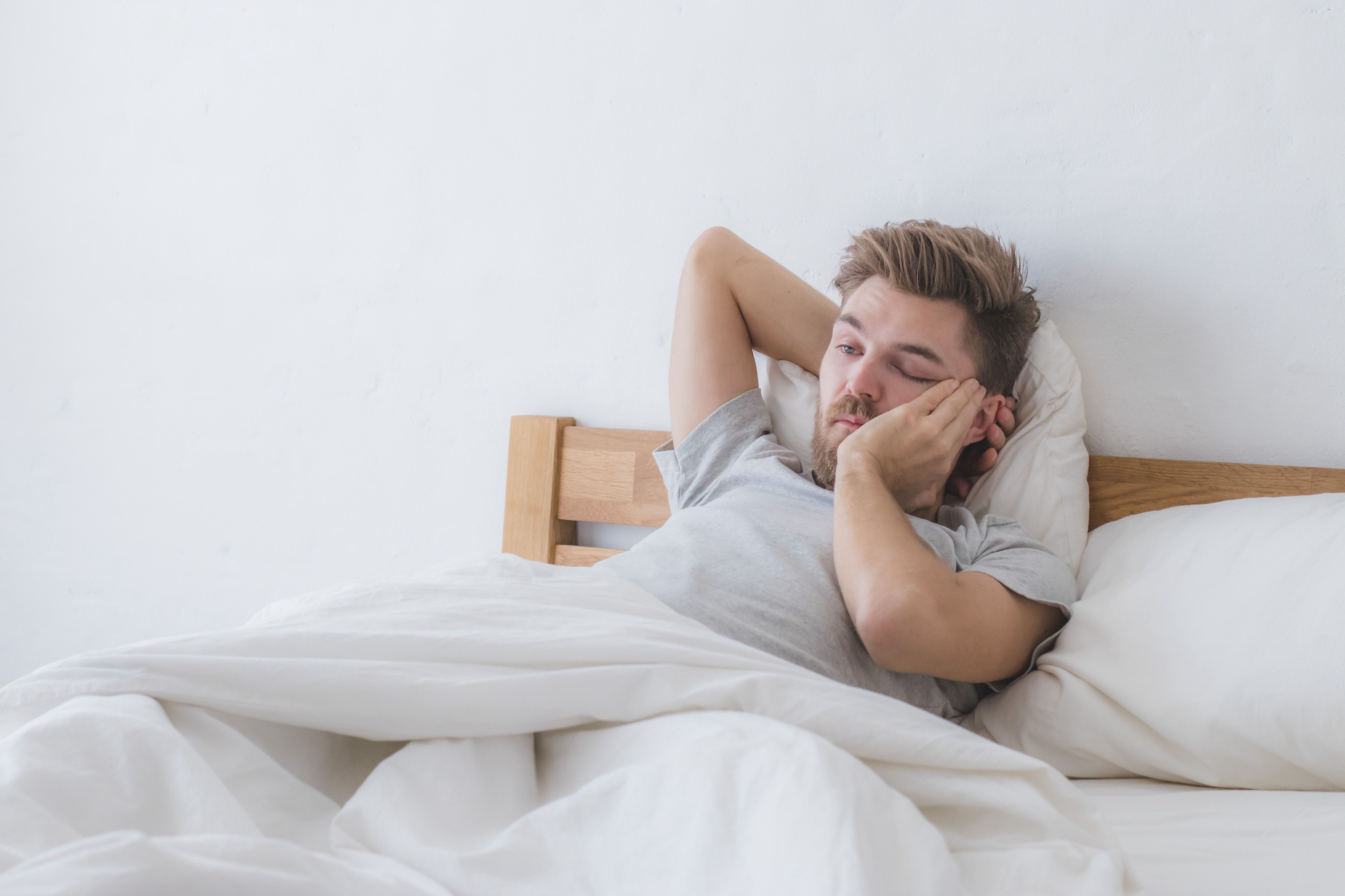If you’ve ever had trouble waking up from deep sleep, then you know it’s not a particularly great way to start your day.
You might go to sleep with the best intentions to pop out of bed when your alarm goes off. But winning the morning battle is much easier said than done.
So, how do you get motivated to jump right out of bed first thing rather than head back to sleep?
Read on to learn the factors that lead to your trouble waking up in the morning and a few solutions to help you feel more energized.
8 Reasons You Have Trouble Waking Up in the Morning
For some, waking up in the morning is the hardest part of their day — it shouldn’t be that way.
The purpose of restful sleep is to revitalize your body so you can wake up refreshed, energized, and ready to tackle whatever the day has in store.
Mahatma Gandhi once said, “When I wake up, I feel reborn.” No doubt, you’d like to feel the same.
Here’s a look at the top eight reasons you’re having difficulty with morning motivation. If any of them sound familiar, you can rest assured there are solutions.
#1 – You don’t have a healthy sleep routine

Studies concluded that if you don’t maintain a regular bedtime routine, it can lead to delayed sleep onset or difficulty falling asleep.
If you have problems falling asleep, your sleep quality may suffer, leading to trouble waking up some mornings.
This is part of the reason why healthy sleep schedules are so critical for waking up energized.
If you lack healthy sleep habits in the hours before bed, you may suffer from daytime sleepiness and other negative health effects associated with sleep deprivation.
One of the most important components of your sleep routine at night is a consistent bedtime.
Most people have alarm clocks for waking up but have you ever considered an alarm clock for going to sleep? Being mindful of when it’s time for bed will help you with your efforts to achieve consistent sleep cycles.
#2 – You’re a night owl

Chronotypes are a person’s natural inclination toward the time of day that they’re awake and asleep.
A ‘night owl’ is a person who stays awake late into the night and prefers to sleep later into the morning. In essence, night owls have trouble waking up in the morning and don’t have a healthy morning routine.
The problem for night owls is that, not only do they find it hard to wake up early, their cognitive functioning is compromised in the morning time — their brains simply don’t work as well.
What’s more night owls tend to report poorer subjective health conditions to ‘morning larks’, or people who get up early and sleep early.
The good news is that a person’s chronotype can shift depending on their behavior. As it turns out, night owls use social media in bed 23% more than morning larks, and they nap 35% more in the daytime.
Both of these things make it harder to get to sleep at night, leading to trouble waking up in the morning.
In other words, if you want to switch from being a night owl to a morning lark, you need better sleep habits.
#3 – Your genetics mean you’re not a morning person
Researchers suggests that your trouble waking up is through no fault of your own — it may be genetic.
This might be a tough pill to swallow. Most people wish they were a ‘morning person’ but the fact is, it may not be written in the stars.
If you feel (or know) that you’re getting the recommended seven to eight hours of sleep at night, yet still wake up feeling like a snail, it could be your genetics.
If this sounds like you, the good news is that the research also suggests that you’re predisposed to being more productive during the nights.
In this sense, it might be wise to delay some of your most important tasks to the later hours when your cognitive ability is at its peak.
#4 – You’re hitting the snooze button

When your alarm goes off and you hit the ever-tempting snooze button, you may be doing more harm than good.
According to sleep specialist, Doctor Reena Mehra all of that ‘snoozing’ isn’t helping you get the restorative sleep that you need to feel energized.
“Much of the latter part of our sleep cycle is comprised of REM sleep, or dream sleep, which is a restorative sleep state. And so, if you’re hitting the snooze button, then you’re disrupting that REM sleep or dream sleep.”
It goes without saying that intentionally disrupting your sleep’ll most likely lead to daytime sleepiness or trouble awakening.
The best solution is to power through. Don’t give in to the snooze button, and do your very best to pop up out of bed when your alarm goes off.
#5 – Sleep phase syndrome
Delayed sleep phase syndrome (DSPS) is a sleep disorder characterized by a person’s inability to go to bed within two hours of (what’s considered) a conventional time for sleep.
Late bedtimes can lead to excessive sleepiness and morning fatigue — especially if you’re not getting the recommended sleep duration.
A common reason for sleep phase disorders is that a person’s circadian clock (body clock) is out of sync.
With sleep phase syndrome, it’s possible that you’ll sleep well once you do fall asleep.
The problem is that waking up for a typical school or workday will be difficult if your circadian rhythms are thrown out.
One solution is to go to bed 15 to 30 minutes earlier every night until your sleep window becomes more conventional.
If going to bed earlier is difficult for you, here are some excellent tips on how to fall asleep quicker.
#6 – You have ADHD
ADHD (attention deficit hyperactivity disorder) is a common medical condition affecting both adolescents and adults.
Shorter sleep time, problems falling asleep and staying asleep, and a higher risk of developing a sleep disorder are all linked to adults with ADHD.
If your sleep efficiency is thwarted due to symptoms of ADHD, then it’s most likely the reason you’re having difficulty waking up in the morning.
If you experience racing thoughts or a burst of energy right before it’s time to go to sleep, then you may be suffering from the medical condition.
In this case, it’s best to seek your medical professional for a diagnosis.
#7 – You aren’t exercising regularly

Exercising regularly has a direct effect on your overall sleep quality and ability to wake up refreshed in the morning.
It doesn’t take much—a simple 30-minute exercise routine will improve your energy in the morning and may also improve your mood throughout the day.
Just be sure you don’t wait until the minutes before bed to start your routine, as an elevated heart rate may lead to problems falling asleep.
Exercise is linked to a better night’s sleep but if you have a regular workout routine and still struggle with sleep, consider reading this article on why you’re not sleeping well.
#8 – You’re exposing yourself to blue light before bed

As previously mentioned, melatonin is a natural sleep hormone that regulates your internal clock and promotes sleepiness.
When you’re exposed to blue light, your body’s natural ability to produce melatonin is compromised.
Considering this, it makes sense that if you’re exposed to blue light before bed, you’ll have difficulty falling asleep.
The best solution is to limit your exposure to electronic devices, such as cell phones or tablets, in the hours before bedtime.
If that’s not a possibility, consider wearing blue-light glasses, which help limit your exposure.
To Summarize
Having trouble waking up in the morning is a rough way to start your busy day.
There are multiple possibilities for why you’re feeling groggy in the morning. Most likely, the underlying cause is that you aren’t getting enough quality sleep.
When you’re mindful of the possible reasons for your sleep problems and how they affect your energy the next day, you’ll be able to set yourself on a trajectory for a long-term solution.
Sleep medications are rarely a sustainable solution to sleep problems. Instead, consider natural remedies for falling asleep.

Welcome to Snoozerville! I’m Dr. Alex Hartley, your guide to the world of restful sleep. With a Ph.D. in Sleep Science and years of experience as a sleep therapist, I’ve dedicated my life to understanding and improving sleep quality. My passion lies in uncovering the mysteries of sleep and sharing practical, science-backed advice to help you achieve the best rest possible. Beyond my academic pursuits, I’m an advocate for mindfulness and relaxation techniques, which I incorporate into my daily routine. At Snoozerville, I aim to transform your nights, combining the latest research with easy-to-implement tips. Whether you’re a chronic insomniac or just looking to improve your sleep hygiene, join me on this journey towards peaceful, rejuvenating sleep.

